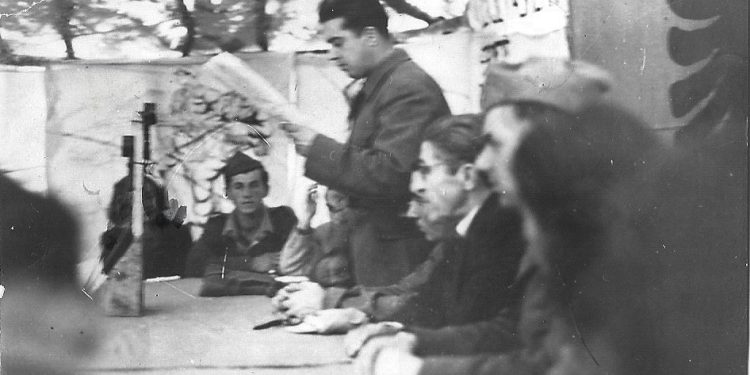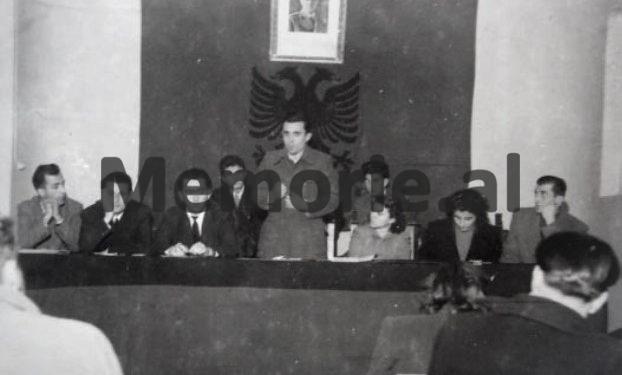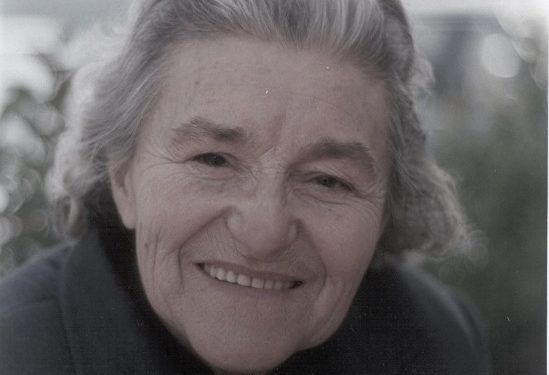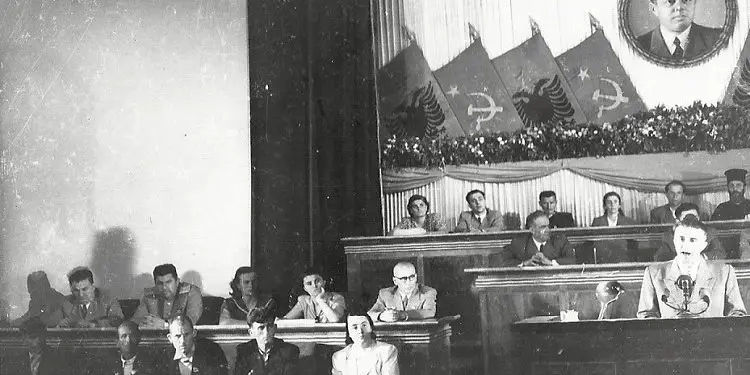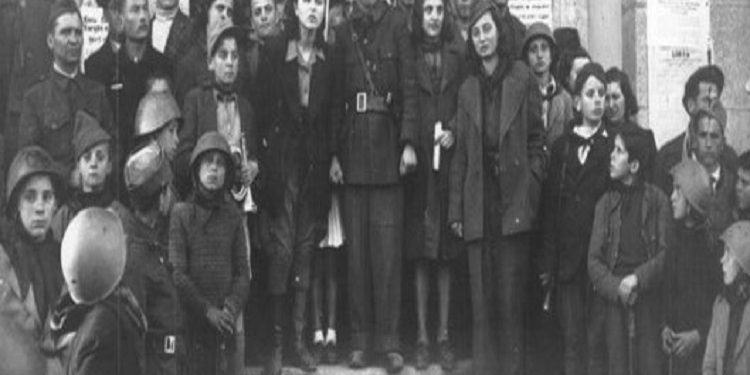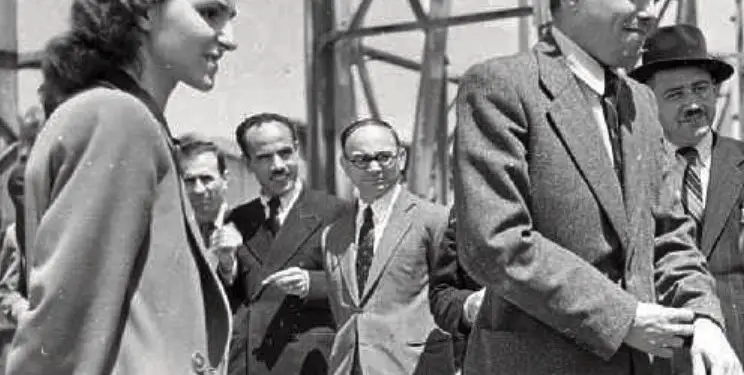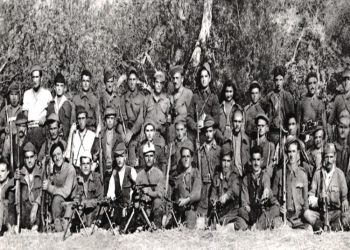Second part
Memory.al. / Liri Belishova, former senior official of the Albanian Youth and Communist Party, since the end of the War, member of the Political Bureau and secretary of the Central Committee of the PPSh, until 1961, who was then beaten and sentenced by Enver Hoxha, ending up in exile as a family for three decades in a row, in one of her interviews before she passed away, she would narrate many episodes related to her life, but also all the privations that followed her family, until the collapse of the communist regime, at the end of 1990. In this long interview, she tells many other episodes related to the death of her ex-fiancé, Nako Spiru, but also many murders, imprisonments, exiles, and other persecutions that Enver Hoxha and the Albanian Communist Party undertook against their comrades and comrades-in-arms, people and personalities with a lot of contribution during the War and after it.
Continues from last issue
Ms. Belishova, how were the relations between Enver Hoxha and Nako Spiros during the War?
I can’t tell you anything about it, because it was war time then. These things were not talked about and I was not one of the main leaders in the Central Committee. I told you, I was one of the youth leaders in Tirana.
Is it true that Nako Spiro, in cooperation with the Yugoslavs, wanted to avoid Enver Hoxha in the plenum of Berat from the leadership of the Communist Party?
I have not been to the second Plenum of Berat and even, from Nakua, I have learned very few things. The one who spoke to me the most was Kiço Ngjela, but he also spoke very little. More about the second plenum, I am informed now by reading the minutes kept then, not in shorthand nor recorded, but nevertheless, I think more or less well kept. From this plenum, it appears that Nakua has been very critical of the way Enver Hoxha and Miladin Popovici have led.
His criticisms are very harsh in the second plenum, but there is also a document published by the Yugoslav Vladimir Dedier, which is a short monograph of Enver Hoxha. I don’t think that this is the biography written by Nako Spiro about Tito, as it has been said because, an intellectual man like Nako Spiro, could not address another party, on a pad, without a title, without a signature and making gibberish ! I think it is not a leaf from his diary because, he kept a diary and kept it in Italian, even after the liberation, he continued to write something.
But where did this diary end up?
To this day, I am not able to know, because when the disaster happened, on November 20, 1947, all the office of Nako Spiros and my office that was attached to it, in our house, all the documents were blocked and taken away… and I I didn’t see them again.
Since we are here, you have been a witness. What is the real date of the liberation of Albania, November 28 or 29?
We Albanians are the only ones to create trouble and useless problems, when we have so many problems. For me, it is November 28 and why I say this: On November 28, the government entered Tirana and this could very well have been announced as the day of Albania’s liberation. However, it was announced as the day of liberation, the day of the liberation of Shkodra.
So, when was Shkodra liberated?
Everyone says that Shkodra was liberated at night, or rather the Germans fled at night. So, if we say that it was liberated on the 29th, then Shkodra was liberated on the night of November 29th. It was the night of November 28 to 29. It was past 12 o’clock or it wasn’t who saw the desert. The fact is that we held a youth rally in the square in front of today’s University, and the news came to us there.
It was the morning of November 29 that Shkodra was liberated. Nako Spiru, even revolted, because he was a very emotional guy, told me that; we told Enver, and I don’t know who else, to leave November 28 as the day of liberation, that this conversation, about who should be “Day of Liberation”, was discussed after the liberation in the Parliament. But, it was also discussed outside the Parliament and why November 28 is being talked about now. Because, it is a very fortunate coincidence for a nation.
November 28, when the Skanderbeg flag was raised in Kruja and the great 25-year epic began; November 28, when the flag was raised by Ismail Qemali and other patriots, as a result of that titanic war of many years in Vlora; November 28, when the partisan government entered Tirana. Of course, that would be great.
However, how did Enveri tell him? “No, no, because November 28 will cover the day of liberation from the party, it will cover the role of the party.” And you know that the Albanian historiography, commanded by the Communist Party, the National Liberation War, the Party, but effectively more Enver Hoxha, raised him as the greatest personality of the entire History of Albania.
Let’s ask you one more question, related to a painful moment in your life. Nako Spiro, was he killed or did he kill himself?
I thought and I think he killed himself. But I want to tell you that the poet Yevtushenko is right when he says: “There is no suicide in this world, there is only murder.” And regardless of who pulled the trigger, which in the end is very, very difficult after so many years, it’s almost 65 years to prove it.
Nako Spiru was a victim of the Yugoslav chauvinists, headed by Tito and their collaborators, Enver Hoxha and Koçi Xoxes, who put him in those positions, accusing him of being an agent of imperialism, an enemy of friendship with Yugoslavia. Rightly, then, he told me: “They don’t ask for self-criticism, they ask for my head; one does not talk about mistakes, but one talks about the enemy”.
How long were you married to Nako Spiro?
I married Nako in January 1946, so we didn’t even complete two years together.
How do you remember his last day when he killed himself?
The last day has been the hardest of all. He went to the Soviet Embassy and those days that he asked to postpone the meeting to prepare, they definitely had the intention to prepare because, it was not so easy, they also had the intention to inform the Soviet Embassy, hoping that, the intervention of the Soviet leadership could save him from this trap. The special envoy of the Soviet Embassy, whose name was Gagarinov, did not accept him at the meeting.
He had accepted it the other days, but not that day. Now I know clearly why he did not accept it, because in the morning of that day, based on the documents that have now been published by the Soviet archives, Enver Hoxha called Gagarinov and told him that; we find that very serious mistakes were made in the policy of friendship towards Yugoslavia, and for this, Nako Spiro is responsible.
We are analyzing in the Bureau and he is taking an unfair position, is not accountable, is asking for a postponement, but we will take very serious measures to correct these mistakes and strengthen friendship with Yugoslavia. So here comes the issue:
That this was the position of Enver Hoxha, a position in favor of the accusation made by Titua and the Yugoslav chauvinists, the accusation supported by Koçi Xoxe. Whereas, if Enver Hoxha would be in the right position, then he should ask the Soviet charge d’affaires for help, saying that; The Yugoslavs are making unjust accusations against us.
Enver Hoxha actually maintained such a position, at the beginning of July 1947, when there were the first accusations of the Yugoslavs, and then he tasked Nako Spiro to collect materials and replied to the Yugoslavs, saying: “You s ‘You are right”.
When did you find out about the suicide and how?
Ah! I received the news of the murder of Nako Spiros at Mehmet Shehu’s house, because Nakoa, before going to the Planning Commission, was very depressed and told me: “I have no escape route left. The Soviet Embassy closed the door on me, Enver Hoxha also closed the door on me”, because he had also gone to Enver Hoxha, wanting to talk to him, but he had told him: “There, at the Bureau, you must give an account” and this had depressed him a lot.
Even Enver Hoxha had joined the Yugoslavs and Koçi Xoxen. Based on this fact, Nako told me: “I have no choice but to keep it to myself”. I cried and then he came and said: “How did you believe it, it was an expression”. And in fact, the Albanians say that I was made to kill myself.
However, after Nakua left and thinking about everything she had told me that afternoon, I started to worry and decided to go to Fiqreti that she was a member of the Plan Commission, whether she was at home or not.
That if Fiqireti was at home, I would ask for her help, telling her about this Nako tragedy. I actually found the Fiqret and that alarmed me more. And, when Fiqreti ran to the Planning Commission to look for Nako, I stayed at Mehmet’s house and Fiqreti announced that Nakoa had killed himself and was taken to the hospital. I left Mehmet’s house, straight to the hospital.
And…did you find him still alive?
Yes, he was alive, but they didn’t let me see him. I stayed until 10:50, when he breathed his last.
Why weren’t you allowed to see it?!
This is a big question mark. Why wasn’t I allowed when he was alive? Mehmet Shehu was actually allowed, Mehmet was inside, but they didn’t let me. Before they told me he was dead, I heard him scream “Ooohh” at the top of his head.
I rushed to the door, but the door wouldn’t open. After a few seconds, Mehmeti came out and told me: “It’s useless Liri, he died, wait until they fix it”. And, after a few moments, I was ushered inside. He was already dead.
How did your life continue after Nako Spiro’s suicide?
Very shortly after Nako’s murder, I was relieved of all the responsibilities I had. Both as a candidate of the Central Committee and as president of the Youth and from the party. In order to communicate this to me, I was called to the apparatus of the Central Committee…. A person who was definitely in charge of this matter told me only that, hand over the party tessa that you are excluded from all functions and from the Party. Why did I tell them, I? “Even ask”, he told me, “I don’t know”?!
I was not called to the meeting, nor did anyone ask me, nor did they listen to me, and that is why it is very painful when, many years after this famous eighth plenum, “Gazeta Shqiptare” published what was said then in the discussions, against me and I know you monstrous things, without any basis and without any explanation.
This was published by “Gazeta Shqiptare”. At least he should say that these things were said at a moment, when the eighth Plenum took place, which Enver Hoxha himself called the blackest stain in the history of our Party, and without these people being present, so that at least they could defend themselves .
How is it explained that several times, after his death, Nako Spiro was convicted and rehabilitated as a figure?
They are not as you say, chaotically. They have their reason. Nako Spiro, in the Eighth Plenum, was called an enemy and condemned. But very soon, Stalin’s letters addressed to Tito arrived. However, Enver had a very difficult time, because of his compromise, but also because of the presence of the Yugoslavs, but not only the Yugoslavs, but also the people of his collaborators, Koci Xoxes, etc.
So from these letters, several months passed, and there was even a meeting of the Political Bureau that openly and publicly condemned him. And only in September 1948, the 11th Plenum took place, which rehabilitated Nako Spiro.
And he was still convicted…?!
And the First Congress was the one that later declared Nako Spiro a hero and with the insistence of Mehmet Shehu, it has been said that the Political Bureau of that time is responsible for the tragic liquidation of Nako Spiro. And it didn’t go well with Enver Hoxha, because his responsibility came out, which is undeniable.
And then, why was he hit and rehabilitated, several times?
After the First Congress, Enver Hoxha left Nako Spiro in silence, neither insulted nor boasted. It was a period of silence. And so it continued, more or less until the book ‘Titiste’, that is, until he also liquidated Mehmet Shehu. I think that, as long as Mehmet Shehu was alive, it was not easy for him to punish Nako Spiro again, and with the “Titistes” Nako Spiro’s punishment is new.
In 1945, immediately after the victory and coming to power of the communists, some of the nationalist figures, who had a contribution to the history of Albania, but in some ways had worked directly or indirectly with the occupiers, were sentenced and some were shot. We mean Bahri Omar, Kol Tromara, etc. How do you judge their punishment, already after almost 60 years?
We have to keep this in mind that we idealistic communists, we wanted with all our hearts a democratic, civilized Albania, etc., but we were much indoctrinated. Hatred was put in the middle, for those who were collaborators of fascism, since in reality, they were not. Class hatred was introduced.
Now, judging by me, the ruling class of Albania, before the communists, that is, those who were actually the wealthy class, who had the wealth in their hands; those who had the culture, who were the most educated; those who were also the political class, because they, in one way or another, had participated in the battles for the independence of Albania in the war of Vlora, in the Congress of Lushnja, with Fan Noli or in the creation of the Albanian state; they did not prove capable in the conditions that were created after the fascist aggression.
And some of them made the big mistake of collaborating with Fascist Italy. I understand that these people were desperate because even that anti-Zogist part, which was the most intellectual, most democratic part, did not have the support of France or England, before the Second World War, because Albania was attacked in 1939.
Thus, what they said, and it was a fatality I think, that we have nothing to do, we will be occupied by fascist Italy and they accepted cooperation with it.
But it was a very fatal mistake. Now, Enver Hoxha has not hit harder those who deserved to be hit as war criminals, those who deserved to be hit without being criminals, but as collaborators. He had rather the interest of power to hit those who could be an obstacle to taking power because Bahri Omari was not a fascist, but he misjudged the need to cooperate with the German.
He did not deserve, I think, to be shot, because there were criminals who deserved it, but he could be sentenced to prison. If Father Anton Arapi, who was a religious, was shot, many others were also shot, who did not deserve to be shot, but for national issues, it should be clear: National treason had to be punished. Memorie.al
The next issue follows




